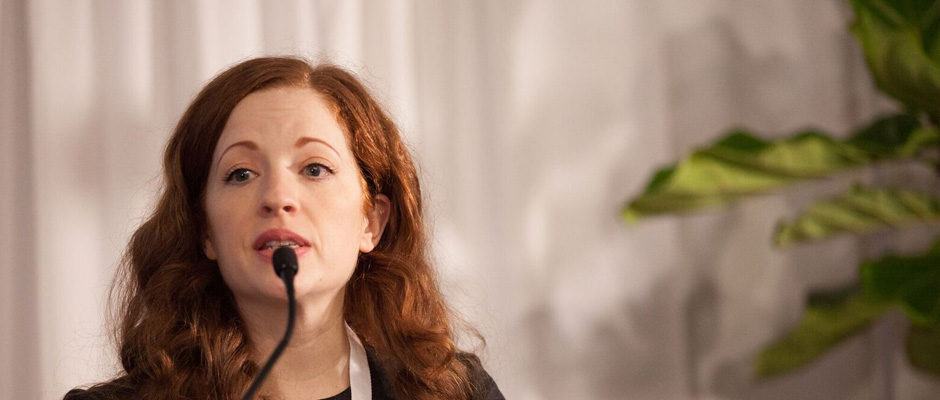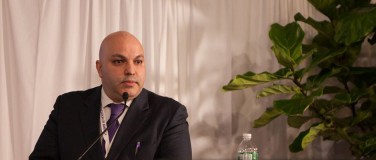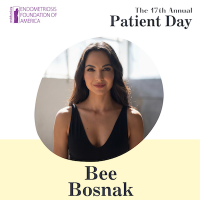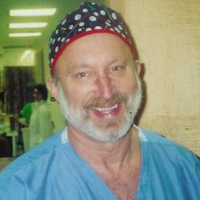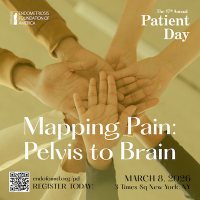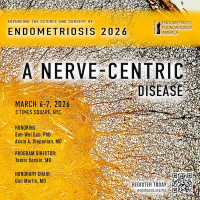PATIENT AWARENESS DAY 2018:
LIVING YOUR BEST LIFE WITH ENDO
Sunday, March 18, 2018, (8am-5pm) Einhorn Auditorium (131 E76th st) at Lenox Hill Hospital, NYC
Enhancing Fertility with Chinese Medicine in Women with Endometriosis
- It's a fertility clinic in New York, it's based in Colorado, and I share a lot of those patients there with the doctors and we end up co-managing these patients, many of whom have endometriosis. So I've learned a lot from them over the years, and I'd like to share those things with you today.
So, my patient population really is trying to get pregnant, and we're at an event today about endometriosis, so I'm not gonna go through the signs and symptoms of endometriosis or the definition, so we can save time on that, but I do want to mention that endometriosis can often be silent, and in my patient population they often don't know they have endometriosis until they've undergone several embryo transfers and an IDF, like doctor Singer was talking about, with normal embryos. So sometimes it's a matter of a diagnosis of elimination.
Endometriosis is confusing because it can be a cause of infertility, but it's not always. Plenty of women with endometriosis get pregnant naturally and can carry to term. So, it's confusing when your friend has endometriosis and gets pregnant, and you receive a diagnosis and it's a cause of your infertility.
Like I said, sometimes the diagnosis is only explored once a patient has had several failed embryo transfers.
Aside from the obvious ways endometriosis can affect fertility through obstructions like adhesions like doctor Singer talked about, scar tissue, blocked tubes, and endometrial cysts on the ovaries affecting ovarian function.
One of the big factors for affecting fertility, especially what I see, is the way that endometriosis in the abdomen will create inflammation and affect the immune system. So, oftentimes even small, tiny lesions, will create an inflammatory response in the body, these are cells, even though they're our own cells, they're in an area of the body where they shouldn't be, and so the body will mount a response like it's an invader. So, it produces inflammation and an immune response. Thank you. This inflammation can affect ovarian function, much like Doctor Singer was talking about, and can affect egg quality, and it can also impede implantation. So, there are some newer tests and theories that inflammation from endometriosis outside of the uterus can affect the way that endometrial receptors inside the uterus are presenting so that an embryo can implant and successfully become a baby.
Chinese medicine is a very theoretical medicine and we diagnose in patterns. So, two people can come see me for headaches and have two underlying pattern diagnoses, and I will treat them in two different ways, even though they're coming to see me for headaches. So, it's important in my medicine to assess the entire body and not just look at the symptom that's presenting. So, I do intake and I talk about sleep, I talk about their energy levels, mood, I talk about digestion and diet, and lots of other organ systems and then I come up with a pattern diagnosis that diagnoses the entire body. So, these titles and these patterns often involve an organ system, or what we call a substance in Chinese medicine, and we'll get into this, but it's basically a label of a collection of symptoms and once I have a pattern diagnosis in Chinese medicine, I can use acupuncture points and herbs that correct that pattern, and in doing so I can resolve multiple symptoms, because they're all related to that one single pattern. So, the patterns in Chinese medicine that I often see associated with endometriosis, are the following. And keep in mind, these are literally just words and labels that I apply to a collection of symptoms and then I can form my treatment plan that helps resolve these symptoms. So, the first one's liver blood stagnation and if we think about endometriosis, how it's these lesions inside the abdomen, it literally looks stuck blood, so that kind of makes sense. The next is kidney qi deficiency, and this is one of the most common diagnoses for infertility or fertility struggles in Chinese medicine, and it has to do less with the kidneys, and I kind of explain it more having to do with the adrenal glands and the stress response. So, the adrenal glands are really in charge of producing hormones that help combat inflammation. So the adrenals can sometimes get a little overwhelmed and not be able to put out the fire that is inflammation, so that gets taxed, and that's one way of thinking about kidney qi deficiency. Dampness is a term that we use to describe when the immune system goes awry, and that can manifest indigestion, it can manifest in the lungs, it manifests in immune weakness or autoimmune conditions, and heat and cold are words that we often use to describe inflammatory response.
So, acupuncture is one of the tools that I use in Chinese medicine to help correct a condition. Just a little visual for you. I like to describe acupuncture as pushing buttons on the body. So, over thousands of years, Chinese medicine developed and evolved, and they started to understand areas of the body that could be stimulated through an acupuncture needle to elicit a specific response elsewhere. So, any acupuncture treatment I give to anyone will put them into the parasympathetic state, which is where a lot of healing and repair is done, it's part of the nervous system, and it's the opposite of the sympathetic, which is the fight-or-flight. So, my clinic is in Manhattan, most of my patients are stressed out trying to get pregnant, and they're often in the fight-or-flight a lot throughout the day. So they come see me, they receive acupuncture, and they go into this parasympathetic state where their body can do some healing, it increases blood flow to the uterus and the ovaries, and they're more relaxed, and their nervous system is more balanced. So, any acupuncture treatment I do helps with that parasympathetic response. But, depending on where I place the needles, it will determine the message that I send to the body. We believe in Chinese medicine that symptoms are our body's way of communicating with us and telling us something's wrong, and I interpret these symptoms, as a practitioner, and I talk back to the body with the acupuncture treatment. So, different points will correlate with a different response. So, if I needle this point right here, at the elbow, I will help calm inflammation all over the body, and different points will do different tasks. Next slide. Another tool that I use are Chinese herbs and we prescribe Chinese herbs in formulas, and this is where it starts to get a little difficult to study Chinese medicine, because each formula is often customized for each patient. Again, since I diagnose and treat in patterns, each patient will have a collection of patterns that I'm trying to work on and I might try to work on one pattern and then go on to the next one that gets resolved, or I might try to go after multiple patterns at once. And I can do that because I customize all my herbal formulas. So, an herbal formula might have anywhere from four to twelve herbs in it, and they can all target different things and synergize and work together. I have my own herbal pharmacy in my clinic and it's in liquids, so I can easily mix formulas really quickly for people, and then it's easy for them to take. But these are some Chinese herbs, some pictures here, they're quite beautiful.
We'll talk about a couple herbal choices for endometriosis in a minute, but I just wanna mention also that, in my practice I use also supplements and diet and lifestyle changes for my patients and again, all of these are customized. I have a nice long chat with each patient when they come in to see me for the first time, we talk for about half an hour to an hour, and I make a customized plan for them. There's no one diet for fertility in Chinese medicine that works for everybody, because everybody's different and they get diagnosed on their pattern. So, I make a customized diet plan and acupuncture and herbal plan. Most of my patients come see me weekly for acupuncture, by the way. Next slide. These two formulas I end up using a lot for endometriosis. They're an opinion. The first is Gui Zhi Fu Ling Wan and the second is Dang Gui Shao Yao San, and this review studied citation I have here, compiles Chinese medicine techniques and shows the efficacy for both reducing the size of lesions, including these two formulas of endometriosis, and also improving pregnancy rates. These two formulas, both of them, address the liver blood stagnation that I talked about, that pattern, as well as dampness, and I see in my clinic that they're helping with symptoms of menstrual cramps and PMS. They can help improve the blood flow of the period, often with endometriosis the blood flow is kind of clotty and dark, so these formulas can help improve the blood flow, so it's nice fresh red, without clots and without cramps. Next slide. And these are two supplements I like to use. One is N-acetyl cysteine, also called NAC, and the other is pycnogenol. These are both antioxidants and they've been shown in studies to help control inflammation with endometriosis and also lower estrogen levels. Oftentimes I see my patients with endometriosis, they have some excess estrogen or estrogen dominant symptoms, and that will create really intense PMS and menstrual cramps. And these two supplements that are available in health food stores, help with both of those, to decrease inflammation and improve their odds of conceiving and improve symptoms. Next slide. So, since I work at a fertility clinic also, I have access to lovely, knowledgeable doctors, and I am very curious. I have a western medical background, I was pre-med and worked in several different medical schools in college and after, doing research, and am very curious about how my medicine and Western medicine can work together to improve patient care and outcomes of fertility treatments. So, I want to spend some time talking about how to combine what I do with IVF and IUI, because it's a large part of what I do, and I think it's really important to understand how to successfully do this. So, my approach when I'm working with someone who's trying to conceive naturally, is a bit different from how I take a role when they're working with a reproductive endocrinologist. I always like to respect,
It's important to understand and to work with someone who is knowledgeable about both medicines, I think, because it's important for your practitioner of acupuncture to understand the goals of a treatment, and I'll send an example here in a minute. Next slide. So, in Chinese medicine, again, I diagnose in patterns, which are a collection of symptoms. So, one drug I wanna talk about it Lupron, which basically suppresses the ovary and sets women into an early menopause, and this is often used, I'm seeing it more and more, when there's suspicion of endometriosis. Some clinics will put women on Lupron for a month or two leading up to an embryo transfer, to quiet the endometrial lesions and reduce inflammation and help regulate the immune system, so everything can calm down. So, Lupron will throw women into menopause symptoms like hot flashes, night sweats, irritability, insomnia, which is really miserable. So, if you're a Chinese medicine practitioner and you don't know the goal of the treatment, which is having a very low estrogen environment, you might see your patient suffering and give them what we call 'yen tonics'. Yen deficiency is a pattern diagnosis we use for low estrogen. But, yen tonics can be estrogenic, which is a no-no, because we want a low-estrogen environment. The goal of the Lupron treatment is to quiet the endometrial tissue so that the body can go in and clean up the inflammation. So, it's important for your practitioner to understand the goals of the treatment, so they don't counteract what your doctor's trying to do. So, in these situations when I'm working with my women on Lupron, I don't try to stimulate the ovaries at all, I don't try to mitigate their symptoms, although acupuncture can kind of help, but it's not going to really do much, there's no estrogen and that's the problem. What I do, is I focus on points that reduce inflammation and calm the immune system, so I work alongside the medications. Next slide. So, in this situation, it's prudent to be conservative, and I usually don't even use herbs or supplements when women are on Lupron, we just let the Lupron do it's job. Next slide. So, it's important to work with an experienced practitioner.
When I'm sharing patients with doctors, I have taken the approach over the years, because part of what I'm doing with my career is trying to educate doctors and patients how to integrate these two medicines, so I always respect the preferences of the lead reproductive endocrinologist, and I often reach out to them and explain what I'm trying to do for their patient, how I'm supporting them, and I'll ask their wishes on herbs and supplements. And some doctors are absolutely on board with herbs and supplements, they've seen the effects that they can have on their patients, and some doctors send me patients and say 'take whatever she says', and other doctors say 'don't ever take Chinese herbs", and part of the reason is because they can be estrogenic and they can fiddle with hormones and they can introduce external hormones at a time when they are trying to very much control these hormones. But there's also the issue of heavy metals and pesticides in some herbs. So, if you get your herbs from an experienced practitioner, not from just any old store in China town, you should be safe. I use a guy in San Francisco who tests every batch for heavy metals and pesticides. But, as a rule, I usually only put my patients on herbs and supplements when they are not on medication, unless explicitly given permission by the doctor. However, acupuncture at any time, at any point, can be a very supportive treatment to include during the fertility journey when either patients are on medications, in the middle of an IVF, or just trying to get pregnant. I do acupuncture on-site at CCRM for embryo transfers, so I go into the room where they'll receive the embryo and I do an acupuncture session both immediately before and immediately after the transfer, and we're getting some really good pregnancy rates doing it that way, and it's also very relaxing. I also participated in a study at RMA, another fertility clinic, a couple years ago, where we surveyed patients undergoing artificial reproductive technologies and doing acupuncture and Chinese medicine and we had a really wonderful response of how it improves quality of life. So, this journey can sometimes be very stressful, some fertility patients can score as high as cancer patients on stress scales and including something like acupuncture and Chinese Medicine can be very helpful for improving quality of life through these treatments. Thank you very much!



